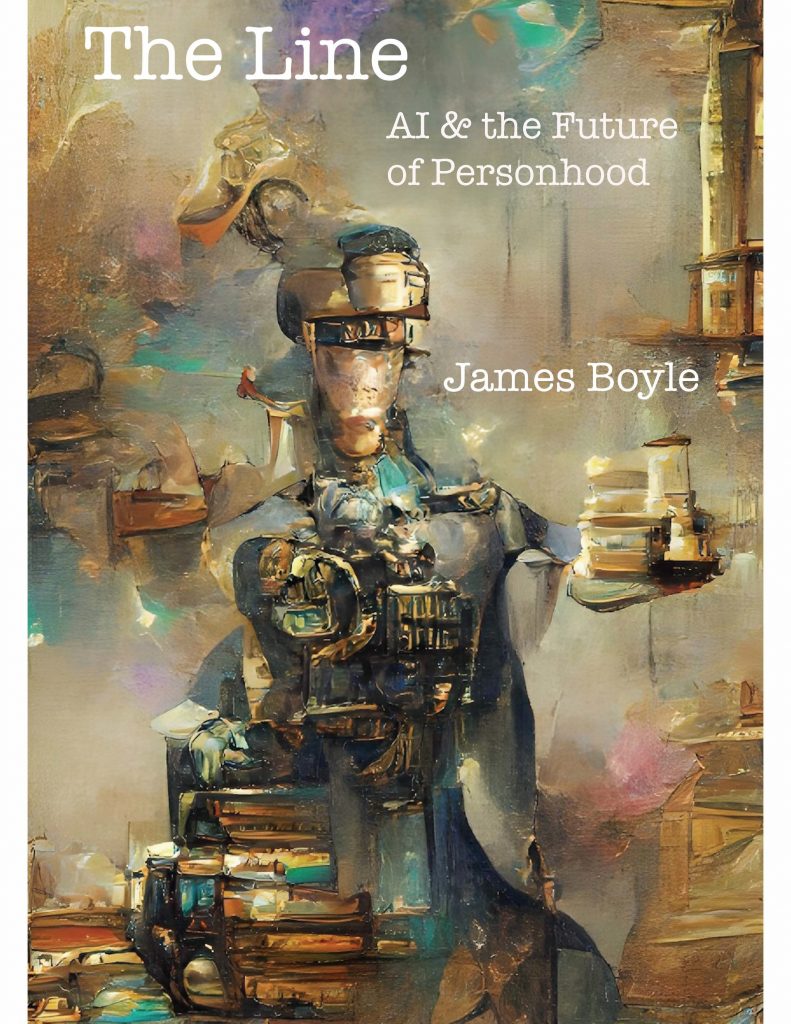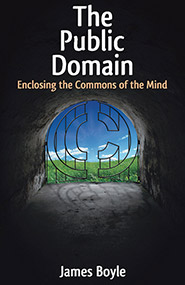An Intellectual Property System for the Internet Age
James Boyle
In November 2010, the Prime Minister commissioned a review of the Britain’s intellectual property laws and their effect on economic growth, quoting the founders of Google that “they could never have started their company in Britain” because of a lack of flexibility in British copyright.. Mr. Cameron wanted to see if we could have UK intellectual property laws “fit for the Internet age.” Today the Review will be published. Its conclusion? “Could it be true that laws designed more than three centuries ago with the express purpose of creating economic incentives for innovation by protecting creators’ rights are today obstructing innovation and economic growth? The short answer is: yes.” Those words are from Professor Ian Hargreaves, head of the Review. (Full disclosure: I was on the Review’s panel of expert advisors.)
The Review makes 10 specific recommendations covering patent, copyright and the policy-making process. Some examples: Patent law needs reform to prevent the formation of “thickets” that actually impede innovation, while patents should never be extended to non-technical software inventions or business methods. We found that while patents are working well for standalone innovations, such as a particular drug developed to treat a particular disease, there are problems in technical fields marked by “sequential innovation” such as information technology.
In the copyright realm, the Review found that our system for dealing with “orphan works” – copyrighted works whose author cannot be found – is broken. As a result, a vast swath of twentieth century culture languishes in our libraries, commercially unavailable and with no one who can give permission for reproduction or republication. It proposes a solution involving a mixture of collective licensing and individual exemptions so that national libraries and individual enthusiasts can digitize the nation’s culture. At the moment, copyright law operates as a one-way valve, locking up these portions of our collective heritage while providing a benefit to no one. Fixing this problem, the Review notes, has no economic downside whatsoever.
Copyright is supposed to make, not to break, markets. Yet the Review found that innovative digital businesses were strangling in the tangled web of licensing copyright has created. As technologies have developed, copyright has created right after right to deal with them, each jealously guarded by its own collection society. Pity the poor entrepreneur who wants to create a new legal business and finds that technological happenstance means multiple rights are involved. This is good for no one (except the middle-men.) The Review suggests that Britain needs to seize the leadership role and become the center for a frictionless, radically simplified, licensing market.
More broadly, the Review argues forcefully that in the future, British intellectual property policy should be evidence-based. As opposed to what, you might ask. Astrology-based? Bizarrely, evidence-based policy is a rarity in the world of intellectual property, while intuition, celebrity endorsement and anecdote run rampant. The Review argues we need to junk this method of doing business and base policies on transparent and rigorous economic methods and not, to use its phrase, “lobbynomics.”
The Review noted that there was a pattern of dysfunction in the way policy had been made; rights had been extended despite clear evidence that this provides no economic benefit, such as retrospective copyright term extension, while reforms languished despite the obvious irrationality of some aspects the current system, such as orphan works. Its conclusion is striking.
“Lobbying is a feature of all political systems and as a way of informing and organising debate it brings many benefits. In the case of IP policy and specifically copyright policy, however, there is no doubt that the persuasive powers of celebrities and important UK creative companies have distorted policy outcomes. Further distortion arises from the fact (not unique to this sector) that there is a striking asymmetry of interest between rights holders, for whom IP issues are of paramount importance, and consumers for whom they have been of passing interest only until the emergence of the internet as a focus for competing technological, economic, business and cultural concerns.”
Whether this Review and the revised institutional arrangements and evidence-based focus can fix that problem is another question. But at least the problem has been identified.
The issue that attracted most attention was David Cameron’s suggestion that Britain might adopt a “fair use” limitation on copyright, like that of the United States, which could adapt to new technologies and kinds of use. This prompted a deluge of submissions from businesses claiming that a fair use standard would destroy the UK creative industries; curious given the flourishing state of the US creative economy. In the words of the Review, this success “does not stop important American creative businesses, such as the film industry, arguing passionately that the UK.. should resist the adoption of the same US style Fair Use approach with which these firms coexist in their home market.” As an expat Brit, pride in my countrymen’s use of irony has rarely been higher.
In any event, the Review took a different tack. First, it notes that “fair use” is only one out of many limitations that allow US copyright law to adapt to new technology while still protecting creators. The question is how to get those same benefits in UK law. Submissions to the Review were divided on the question of whether EU law would allow the UK today to adopt an open-ended exception to copyright such as fair use. As a legal scholar, I was impressed by the arguments put forward by Cambridge professor Lionel Bently that EU law would permit such an approach, but the Review’s legal advisors disagreed. Significantly, the Irish government has just announced a similar review to see if its copyright laws need a fair use provision. We shall see if it comes to the same conclusion.
The Review’s approach was a multi-part strategy. First, it favours a bevy of individual limitations – maxing out the exceptions permitted by EU law. Private individuals should finally be able to format shift content they have bought. There should be a broad exception for archival copying. Copyright law should no longer impede scientific research by blocking text and data mining of the scientific literature. Parody and criticism should receive more robust protection. But what of the effect of copyright on disruptive technologies? Here the Review favoured an EU wide approach, and one with teeth. “The UK should give a lead at EU level to develop a further copyright exception designed to build into the EU framework adaptability to new technologies… The Government should also legislate to ensure that these and other copyright exceptions are protected from override by contract.”
When I accepted Baroness Wilcox’s invitation to join the Review I was told that advisors would not be held out as agreeing to all of its conclusions. That was fair and I don’t. The section on enforcement, for example, pulls back from the obvious conclusion to its analysis: radical private enforcement measures like the Digital Economy Act are deeply problematic. Still, for anyone who cares about fostering innovation while protecting creators? The Hargreaves Review is worth a read. In the short run, the fact that it actually “names” the dysfunctions of our current policy process will cause high blood pressure for some. But in the long run, I think the streamlined, low transaction cost, evidence-based intellectual property system it suggests – a world with fewer patent thickets, fewer orphan works, fewer examples of copyright breaking instead of making markets – will actually be seen as profoundly positive not only for society, but for digital businesses themselves.
James Boyle is William Neal Reynolds Professor of Law at Duke Law School. His most recent book is The Public Domain: Enclosing the Commons of the Mind.









[…] El día de ayer la Oficina de Propiedad Intelectual del Reino Unido publicó el Reporte Hargreaves, un estudio independiente acerca la situación actual del copyright en relación al crecimiento económico de ese país. La investigación fue comisionada al Profesor Ian Hargreaves, al frente de los estudios de Economía Digital en la Universidad de Cardiff en Reino Unido. Además, el estudio estuvó supervisado por académicos de la talla de James Boyle. […]
[…] El día de ayer la Oficina de Propiedad Intelectual del Reino Unido publicó el Reporte Hargreaves, un estudio independiente acerca la situación actual del copyright en relación al crecimiento económico de ese país. La investigación fue comisionada al Profesor Ian Hargreaves, al frente de los estudios de Economía Digital en la Universidad de Cardiff en Reino Unido. Además, el estudio estuvó supervisado por académicos de la talla de James Boyle. […]
[…] so many times during the last decade: Is the UK intellectual property system working as it should? Now the answer is out, and it’s negative in more ways than one. The first negative is that the report conclude that the […]
[…] reconoce el punto más importante del grave problema de las leyes de propiedad intelectual: se crean en de forma esotérica y no en base a evidencia, por lo cual volver a la racionalidad parece algo sumamente radical.La […]
[…] . It recognizes the most important point of the serious problem of intellectual property laws are created so esoteric and not on evidence, which return to rationality seems very radical. The notion that laws […]
[…] lawmaking on intellectual property should be “evidence-based”. As opposed to what, asks the legal scholar James Boyle: “Astrology-based?” But our lawmaking in this area has been so weird that the idea that […]
[…] James Boyle for The Public Domain. “The Hargreaves Review Published Today.” […]
[…] de autor debieran ser tomadas en base a evidencias empíricas y no a intuiciones. Es gracioso (James Boyle ironiza preguntándose si no es así, cómo se toman las decisiones, ¿según la astrología?), pero en […]
[…] reconoce el punto más importante del grave problema de las leyes de propiedad intelectual: se crean en de forma esotérica y no en base a evidencia, por lo cual volver a la racionalidad parece algo sumamente radical. La […]
[…] James Boyle for The Public Domain. “The Hargreaves Review Published Today.” […]
[…] who comment on the Review: Open Rights Group, FutureOfCopyright, Prof. James Boyle, The Register, BBC, David Prosser, Jeremy Silver, Laurence Keye, Wellcome […]
[…] – overlapping intellectual property rights that impede technological innovation. According to James Boyle, a member of the review committee’s expert advisory panel, patent thickets are most prevalent in […]
[…] Hargreaves Review published. The review evaluates the fitness of the UK’s intellectual property regime for an internet age. It finds that IP laws put in place several hundred years ago are now stifling modern innovation and goes on to make ten specific recommendations for IP law reform to correct the problem. These recommendations include approaches to clearing patent thickets; dealing with orphan works; and transitioning to evidence-based, rather than lobby-based, IP policy; as well as rejection of a US-like fair use limitation. […]